Casualisation of the academic workforce in tertiary education: Time to rethink your engagement strategy for sessional academics
By Cindy Leung
Over the last few years, sessional academic staff (sometimes referred as casual academics) have become an increasingly significant proportion of the workforce in Australian universities. A recent study reported that sessional academics accounted for approximately 60% of the academic workforce in Australia. This trend in the casualisation of tertiary teaching creates a need to better understand factors influencing the engagement of sessional staff.
Voice Project has surveyed the majority of Australian Universities, and our findings suggest that permanent and sessional academic staff face different issues within the workplace. Permanent academic staff tend to be most dissatisfied with:
their workload,
poor cross-unit cooperation between Faculties and Divisions,
work processes, and
career opportunities.
On the other hand, existing literature and our data suggest that other workforce issues affect sessional academics. These issues include:
inadequate learning and development opportunities,
uncertainty regarding ongoing contract renewal and career development,
pay not reflecting additional work such as student consultation and marking, and
the contributions of long-term sessional academics not being recognised.
Given that ongoing and sessional staff face different issues, a one-size-fits-all approach may not be appropriate when it comes to understanding and addressing issues faced by sessional academics.
Indeed, recent surveys of four Australian universities using the Voice Project Sessional Staff Engagement Survey (see below for more detail) confirm key findings reported in the literature. While sessional academic staff tend to enjoy their jobs, they are generally dissatisfied with the lack of:
career opportunities: only 12-15% of sessional staff agree that there are enough opportunities for a permanent role.
job security: 38-54% of sessional staff are confident that they will be offered ongoing sessional work.
pay and recognition: 48-64% believe that their pay is reasonable or reflect the amount of work they carry out.
So what can be done to address these issues? Well, one university client identified career opportunities as a key priority for improvement following their Sessional Engagement Survey. This University introduced a range of initiatives such as online application system for job opportunities, fellowships, and training and development requirements and subsequently reported significant improvements in a number of practices. Specifically, there was a 40% improvement in perceptions about opportunities for permanent employment. As it can be seen, it is possible to measure and achieve positive change among this growing segment of academic workforce.
sessional staff engagement survey
In a joint effort with a number of Universities, Voice Project recently developed and refined the Sessional Staff Engagement Survey that is specifically designed to measure sessional engagement and work experience. This tool drew insights from a number of sources including literature review, consultations with key stakeholders, focus groups with sessional academics, and previous engagement surveys for sessional staff. This survey takes about 5-10 minutes to complete and captures a range of relevant management practices. The survey can be further tailored to suit the needs of individual universities. It can also be administered alongside an engagement survey for ongoing/permanent staff to help determine overall and specific strategic priorities and facilitate change.
We look forward to working with more universities or education institutions to improve their staff engagement. If you have any questions about this tool or how we can help education institutions to improve staff engagement, please contact Voice Project at enquiries@voiceproject.com or +61 2 8875 2800.
References
Bexley, E., Arkoudis, S., & James, R. (2013). The motivations, values and future plans of Australian academics. Higher Education, 65, 385-400.
Ryan, S., Burgess, J., Connell, J., & Groen, E. (2013). Casual academic staff in an Australian university: marginalised and excluded. Tertiary Education and Management, 19, 161-175. DOI: 10.1080/13583883.2013.783617
Bryson, C. (2013). Supporting sessional teaching staff in the UK – to what extent is there real progress? Journal of University Teaching & Learning Practice, 10, 1-17.
Langford, P. H. (2010). Benchmarking work practices and outcomes in Australian universities using an employee survey. Journal of Higher Education Policy and Management, 32, 41-53.

